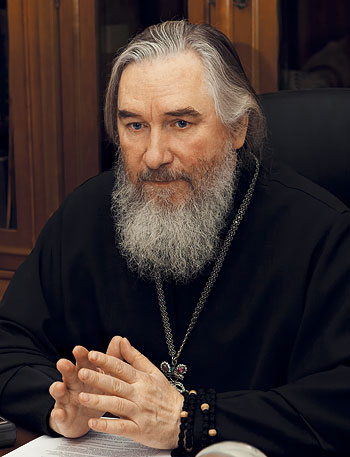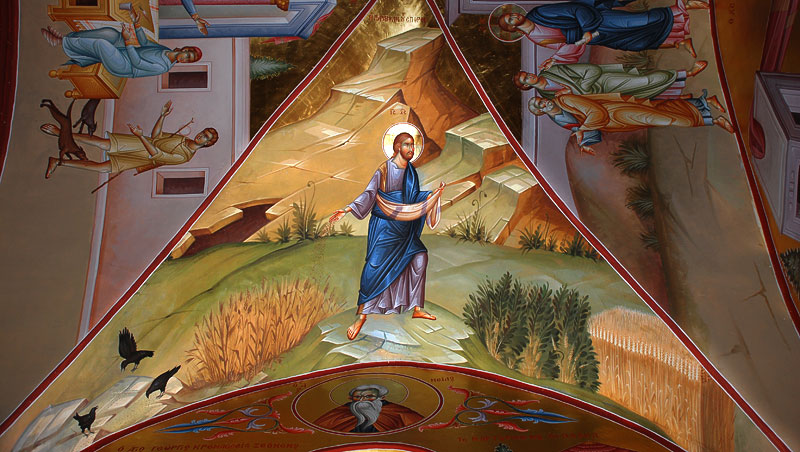The Lord spake this parable: “There was a certain householder, which planted a vineyard, and hedged it round about, and digged a winepress in it, and built a tower, and let it out to husbandmen, and went into a far country: and when the time of the fruit drew near, he sent his servants to the husbandmen, that they might receive the fruits of it. And the husbandmen took his servants, and beat one, and killed another, and stoned another. Again, he sent other servants more than the first: and they did unto them likewise. But last of all he sent them his son, saying, ‘They will reverence my son.’ But when the husbandmen saw the son, they said among themselves, ‘This is the heir; come, let us kill him, and let us seize on his inheritance.’ And they caught him, and cast him out of the vineyard, and slew him. When the lord therefore of the vineyard cometh, which will he do unto those husbandmen?” They say unto Him, “He will miserably destroy those wicked men, and will let out his vineyard unto other husbandmen, which shall render him the fruits in their season.” Jesus saith unto them, “Did ye never read in the Scriptures, ‘The Stone which the builders rejected, the same is become the head of the corner: this is the Lord’s doing, and it is marvellous in our eyes’?” (St. Matthew 21:23-42).
 A parable is a short cautionary tale with a deep meaning. Christ often spoke in parables when addressing people. Through simple images and understandings for those around him, He revealed truths of human life and the mysteries of God’s economy of human salvation for those around Him. St. John Chrysostom says that Christ, through parables, fleshed out the “truth in living images” so that we might “more deeply imprint them in our memory.”
A parable is a short cautionary tale with a deep meaning. Christ often spoke in parables when addressing people. Through simple images and understandings for those around him, He revealed truths of human life and the mysteries of God’s economy of human salvation for those around Him. St. John Chrysostom says that Christ, through parables, fleshed out the “truth in living images” so that we might “more deeply imprint them in our memory.”
Thus, in the parable of the prodigal son, who squandered the father’s inheritance, the Lord shows God’s love for sinful man; in the parable of the Good Samaritan, He shows who our neighbor is and what kind of love we should have for him. The Gospel narrative of this Sunday offers us the parable of the hired vineyard, which showed audacity and ingratitude to its master (Matthew 21:33-42).
A certain householder planted a vineyard and hedged it round about, and digged a winepress in it, and built a tower, and let it out to husbandmen, and went into a far country. He fully entrusted them with his property in the hope that they, working it, would gather the harvest and give it to him. But the husbandmen acted differently.
Without going through the entire content of the parable, let us consider its meaning. Adam was called by God to cultivate Eden, the garden of paradise: the garden of his soul, the very same vineyard that the Lord planted. Each of us has been entrusted with the greatest treasure in the world: the human soul. How diligently we began working for Christ; how zealously we began to rush to church! The time comes when the Christian life begins to weigh on us; more and more rarely do we overcome our laziness in order to approach the Holy Mysteries; we forget about reading the Gospel and reduce our prayer rule to nothing more than “Lord, have mercy!”
When the time of the fruit drew near, he sent his servants to the husbandmen, that they might receive the fruits of it.
When in the bustle of everyday life we meet those “servants” of the Lord, our neighbors whom He sends to take His fruit, the fruit of the fulfillment of the commandments of the Gospel: gentleness, brotherly love, respect for parents, love…
In our life there are unusual events: deliverance from certain death, the resolution of difficult situations in life, success in business, and much else that demonstrates God’s providence for us. Sometimes one becomes a witness of a true miracle, of healing from a mortal disease. In all these situations we in fact experience the closeness of Christ. But how do we perceive Him?

But last of all he sent them his son, saying, ‘They will reverence my son.’ But when the husbandmen saw the son, they said among themselves, ‘This is the heir; come, let us kill him, and let us seize on his inheritance.’
It would seem that what we have experienced should prompt us to feats of love. But it is astonishing how quickly man calms down and forgets the help that the Lord has given him, continuing to live as the sovereign “master” of his own life. How quickly, and with what astonishing nonchalance, do we return to the same vices that had nearly ruined our body and soul! We live our life from day to day, leaving no place for Christ in our heart.
When the lord therefore of the vineyard cometh, which will he do unto those husbandmen?” this question is addressed to all the descendents of Adam.
In the parable of the husbandmen, Christ tells of His own voluntary death on the Cross for us: For God so loved the world, that He gave His only-begotten Son, that whosoever believeth in Him should not perish, but have everlasting life (John 3:16). This Sunday is special, for it precedes the Feast of the Elevation of the Lord’s Cross. Our unrighteousness and unwillingness to bear our cross makes us look like these husbandmen, about which the parable speaks. Having been baptized, one should no longer live for himself, but rather for the meaning of Christianity: For whosoever will save his life shall lose it: but whosoever will lose his life for my sake, the same shall save it. For what is a man advantaged, if he gain the whole world, and lose himself, or be cast away (Luke 9:24-25). The Cross is the symbol of victory over sin and the overcoming of self-love.
The Christian’s way of salvation is the narrow path of bearing one’s cross on Golgotha, which leads to eternal life with Christ: If any man will come after Me, let him deny himself, and take up his cross daily, and follow Me (Luke 9:23).
Translated from the Russian.













